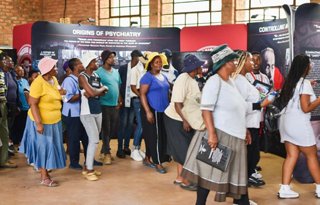Citizens Commission on Human Rights Exposes Psychiatry’s Role in Oppressing Black South Africans
Psychiatry: An Industry of Death exhibit draws crowds in the township of Zithobeni in Gauteng, South Africa, spotlighting psychiatry’s role in apartheid and its continuing threat to human rights.

Hundreds of South Africans visited the Psychiatry: An Industry of Death exhibit at the Zithobeni Community Hall, where they were introduced to the destructive legacy of psychiatry and its ongoing impact on Black communities. Hosted by the Citizens Commission on Human Rights (CCHR), the exhibit—under the theme Taking Mental Wellness and Human Rights to Communities—resonated deeply with residents, community leaders and professionals.
The exhibit highlighted the insidious link between psychiatry’s creation and support of eugenics and apartheid. South African Prime Minister Hendrik Verwoerd—a psychologist educated in Nazi Germany—applied racist psychiatric theories to craft apartheid policies. Psychiatrists supported the regime with pseudoscientific claims of Black inferiority, helping to justify widespread discrimination, denial of education and the destruction of families, communities and entire cultures.

For decades, Black South Africans were funneled into psychiatric institutions through secret government contracts that guaranteed high occupancy rates. Tens of thousands were committed without consent, drugged, subjected to electroshock without anesthesia and forced into unpaid labor—practices exposed by CCHR in the 1970s. When local laws attempted to silence CCHR’s reporting of these abuses, the organization took its findings to the World Health Organization (WHO). A 1983 WHO report compared the psychiatric labor camps to slavery and confirmed widespread neglect, abuse and preventable deaths.
“Many people today seek quick fixes, often turning to psychiatric medications with potentially serious side effects. These medications can have a profound impact on our minds and bodies.”
The Zithobeni exhibit brought this history to light for many for the first time. “My eyes are opened now after seeing the exhibit,” said one attendee. “Psychiatrists must be punished and expelled from health centers,” said another. The event shifted public opinion, with a majority of attendees leaving with a changed view of psychiatry—the raw, shocking facts now clearly etched in their minds.

Speakers at the event urged the community to reject psychiatric coercion and flagrant abuses and instead embrace wellness, dignity and informed choice. One respected community leader warned, “Many people today seek quick fixes, often turning to psychiatric medications with potentially serious side effects. These medications can have a profound impact on our minds and bodies.” Another reminded the audience that eugenics’ “racist and discriminatory ideas undoubtedly contributed to the intellectual climate that allowed apartheid to flourish.” Others emphasized that the ideologies that underpinned apartheid have not disappeared—they’ve simply been repackaged.
The Citizens Commission on Human Rights, founded in 1969 by the Church of Scientology and psychiatrist Dr. Thomas Szasz, continues to fight for a mental health system rooted in dignity, freedom and informed choice. The organization has been instrumental in exposing abuses globally and, in South Africa, remains committed to ensuring communities know their rights and the full truth about psychiatry’s role in their oppression.


